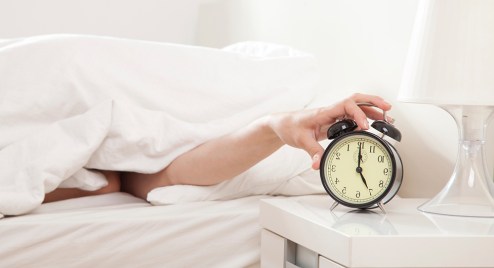Understanding PMS
Each month, bestselling author and speaker Henrietta Norton discusses an area of women’s health and offers her perspective and advice. Here, she looks at PMS symptoms and natural remedies to help women through their monthly cycle

5 minute read
Nearly two out of five women between the ages of 14 and 50 experience some symptoms of premenstrual syndrome (PMS) and 10 per cent of these women have symptoms severe enough to disrupt their usual activities. PMS is a cluster of physical and emotional symptoms associated with the menstrual cycle. Reproductive hormones and neurotransmitters are thought to play a central role in the development of PMS, which is commonly experienced in the five to 10 days prior to menstruation.
No symptoms are the same
For most women, PMS is a subjective experience, producing symptoms that are unpleasant but manageable. For some, it is a debilitating condition that renders them virtually paralysed by their symptoms. Nutritional textbooks divide PMS into four subtypes:
PMS-A (anxiety) is the most common type. Symptoms include anxiety, irritability and nervous tension. Raised oestrogen and low progesterone are associated with this type.
PMS-C (cravings) is characterised by an increase in appetite, craving for simple carbohydrates and fluctuations in blood sugar. Indulgence in simple sugars results in fatigue, headaches, palpitations, dizziness or fainting. This type of PMS is attributed to imbalances in fatty acids as well as blood sugar imbalances and, more specifically, low magnesium.
PMS-D (depression) is the least common but most serious manifestation of PMS. Symptoms include depression, tearfulness, confusion, insomnia and withdrawal. Low levels of oestrogen, high progesterone and DHEA are implicated in this subtype, as well as imbalances in the neurotransmitter serotonin.
PMS-H (hyperhydration) is associated with symptoms of water retention, abdominal bloating, breast tenderness and weight gain. High levels of stress, excess oestrogen, magnesium deficiency, and low production of dopamine can be associated with this subgroup.
Magnesium
Magnesium performs a number of critical functions in the body, including supporting the nervous system, especially during times of stress. Suboptimal levels of magnesium have been noted in women suffering from PMS. In one double-blind, randomised study,* women deficient in magnesium and suffering from PMS were given magnesium for the last half of their menstrual cycle. After the second month, the treatment group reported a significant improvement (using The PMS Distress Questionnaire), specifically on questions related to mood.
Omega-6 fatty acids
Essential fatty acids such as borage oil, evening primrose oil and flax oil help reduce inflammatory prostaglandins and increase prostaglandins that relieve menstrual cramping, breast pain, water gain and increased clotting. They can also help stimulate small amounts of oestrogen, which ameliorates PMS complaints.
Probiotics
Acidophilus cultures that are dairy-free and certified live can promote healthy flora in the bowel. Many women with chronic yeast infections, a history of antibiotic use, a high intake of refined foods, high stress, chronic corticosteroid use or birth control pill use may have a bowel flora imbalance (dysbiosis). A programme to enhance bowel flora can benefit in these conditions. Lactobacillus acidophilus and bifidobacterium bifidus metabolise phytoestrogens found in plants and pulses into isoflavones, making acidophilus supplementation a worthwhile support when addressing PMS.
Vitamin B6
Vitamin B6, also known as pyridoxine, has reported benefi ts for reducing PMS symptoms. Studies have shown improvements in PMS symptoms (including cramping, fibrocystic breasts and excessive bleeding) by 70 to 88 per cent. The pre-metabolised form of vitamin B6 has been shown to be the most effective and this form can be found in food and natural food-grown supplements.
Vitamin E
In a randomised, double-blind study, doses of 400 IU daily have reportedly produced significant improvement in certain affective and physical symptoms in some women with PMS. Vitamin E in nature includes eight compounds, which includes four tocopherols: alpha, beta, gamma and delta. The natural form of vitamin E, d-alpha tocopherol, has been reported to have greater bioavailability than synthetic forms of the vitamin.
Dong quai
Dong quai is thought to be one of the most important remedies in Chinese medicine. It has been used for centuries for a variety of female complaints and is considered a tonic for women who are tired, recovering from illness or have low vitality. Dong quai is rich in phytoestrogens, helping to balance out both insufficient and excess levels of oestrogen associated with PMS symptoms. Epidemiological studies have shown that dong quai has been used for generations in females, who report better results and fewer adverse effects than with prescription oestrogen replacement products.
Aromatherapy
Symptoms of PMS may be relieved by using essential oil therapy in a bath or diffuser. Try the following oils in a bath or in a diffuser, as needs indicate:
- Clarysage (Salvia sclarea): five drops.
- Ylang-ylang (Cananga odorata): four drops.
- Lavender (Lavandula augustifolia): three drops.
Temporary relief from the symptoms associated with water retention may be experienced by using juniper oil (Juniperus communis) in a hot bath and soaking for at least 20 minutes. No more than eight to 10 drops should be necessary. Remember, essential oils should not be used during pregnancy or lactation, unless under the supervision of a trained aromatherapist or healthcare practitioner.*
*Check for contraindications
A method to the madness
Menstruation, just as pregnancy, is not a medical ‘condition’, but rather a natural cycle within a woman’s life. Perhaps within our menstrual cycle lies the architecture of our emotional, physical and spiritual health, and each month we have the opportunity to connect with how we are really feeling. ‘To see the cycle as the enemy can set you up for more suffering, but working with and within its rhythmic imperatives can be your foundational path to healing,’ say Alexandra Pope and Sjanie Wurlitzer, authors of the book Wild Power: Discover The Magic Of Your Menstrual Cycle And Awaken The Feminine Path To Power (Hay House, £12.99).
Our expert, Henrietta Norton, is a registered nutritional therapist, a women’s wellbeing writer and expert, and co-founder of food-grown supplements brand Wild Nutrition, @wildnutritionltd
Image: Getty









